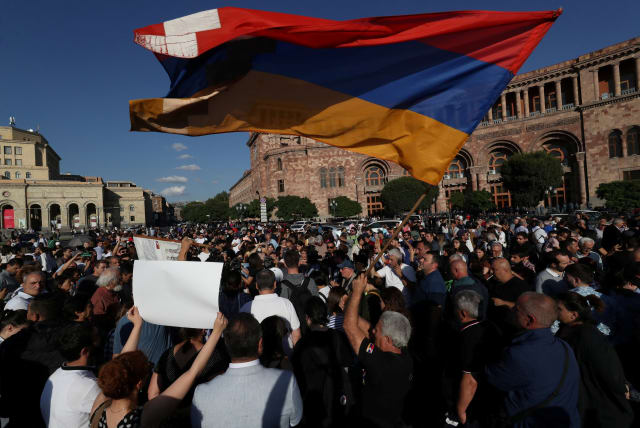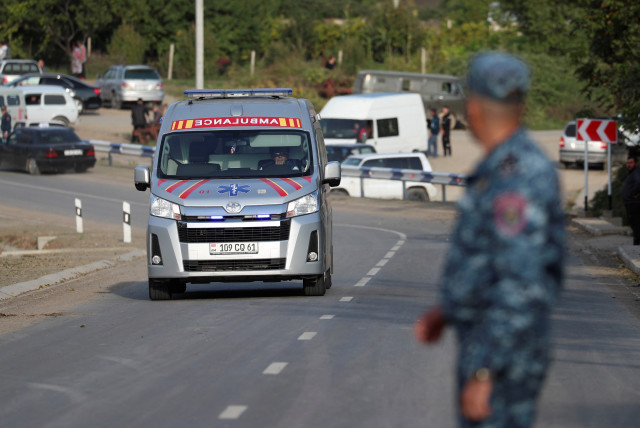Armenia urges EU to sanction Azerbaijan, warns of further attack

Armenian officials say they have reason to believe that Azerbaijan may strike inside Armenia, despite denials.
Armenia urged the European Union on Monday to sanction Azerbaijan for its military operation in the Nagorno-Karabakh enclave and warned that Baku could soon attack Armenia itself unless the West takes firm action.
Tigran Balayan, Armenia's envoy to the EU, listed possible measures such as a price cap on Azerbaijani oil and gas and the suspension of EU talks on closer relations with Baku. He also urged the West to deliver "bold" security assistance to Armenia.
"It's not only the opinion of the Armenian government, but also of many experts - also some of the EU member states - that an attack on Armenia proper is imminent," Balayan told Reuters in an interview in Brussels.
Azerbaijani forces took control of Nagorno-Karabakh, an enclave on its territory populated by ethnic Armenians, in a lightning operation last month, triggering an exodus of more than 100,000 Armenians in less than a week.
Accusations of ethnic cleansing against Azerbaijan
Armenia has accused Azerbaijan of ethnic cleansing - a charge denied by Baku, which has insisted the enclave's Armenians were welcome to remain in the territory. Baku has also insisted it has no intention of attacking Armenia itself.

But Balayan said Azerbaijani President Ilham Aliyev's assurances could not be trusted, noting European officials have declared he broke promises not to attack Nagorno-Karabakh.
He said the EU had many tools to pressure Aliyev - and Nagorno-Karabakh had paid a heavy price because it had not used any of them so far.
"The failure of ... employing this toolbox resulted in the ethnic cleansing of 100,000 to 120,000 of the indigenous Armenian population, including my own family, from their ancestral lands," said Balayan, Armenia's ambassador-designate to the EU.
Senior EU officials, and leaders of many of the bloc's member countries, have condemned Azerbaijan's actions. But the EU has so far taken little in the way of concrete measures in response to the crisis, beyond allocating humanitarian aid.
Diplomats say EU members are struggling to find a consensus. Some, such as France and the Netherlands, want to at least consider tough measures, while others such as Hungary and Romania are reluctant, they say.
The EU's search for a response is complicated by its moves to rely more on Azerbaijani oil and gas as it has pivoted away from Russian energy due to Moscow's war in Ukraine.
European Commission President Ursula von der Leyen visited Aliyev in Baku last year to sign a memorandum of understanding on energy, and declared Azerbaijan to be a "crucial partner."
But Balayan insisted the EU had real leverage on energy, as Baku relies heavily on European countries as customers.
Granada meeting
He said a meeting expected this week at a summit in Granada, Spain, between Armenian Prime Minister Prime Minister Nikol Pashinyan, Aliyev, German Chancellor Olaf Scholz, French President Emmanuel Macron and European Council President Charles Michel would only yield results if the EU was tough with Aliyev.
"Unless there are certain red lines put in front of Aliyev personally for not keeping his word ... it will be in vain again," he said.
Balayan voiced fears that Azerbaijan would use force to establish a land corridor through Armenian territory to the exclave of Nakhchivan, which would also provide a link to Turkey, Baku's ally.
Azerbaijan insisted last week it did not intend to take any such action.
But Balayan said Azerbaijan's military goals could extend even beyond Nakhchivan, noting Aliyev had made comments that asserted Armenian territory was formerly part of Azerbaijan.
He said Armenia had been left exposed in security terms as its traditional ally Russia had not delivered hundreds of millions of dollars in weapons orders.
"We are in a very vulnerable position," he said.
Balayan declined to specify what kind of security assistance Aremenia wanted, saying that was a matter of technical experts.
